Theories of International Relations: War, Cooperation, and Peace
VerifiedAdded on 2020/04/21
|13
|3436
|62
Homework Assignment
AI Summary
This assignment delves into the multifaceted realm of international relations, primarily focusing on the enduring debate surrounding the inevitability of war and the challenges inherent in fostering international cooperation. It meticulously examines prominent theories, including liberalism, realism, neoliberalism, and constructivism, to provide a comprehensive understanding of the complexities of global politics. The analysis explores the contrasting perspectives of each theory, highlighting how they address the presence of war in the international system. Furthermore, the assignment investigates the obstacles that impede sustained international cooperation among nations, such as societal distrust, competition, and the limitations imposed by the concept of sovereignty. By evaluating these diverse theoretical frameworks and practical challenges, the assignment offers a nuanced perspective on the dynamics of war and peace in the globalized world.
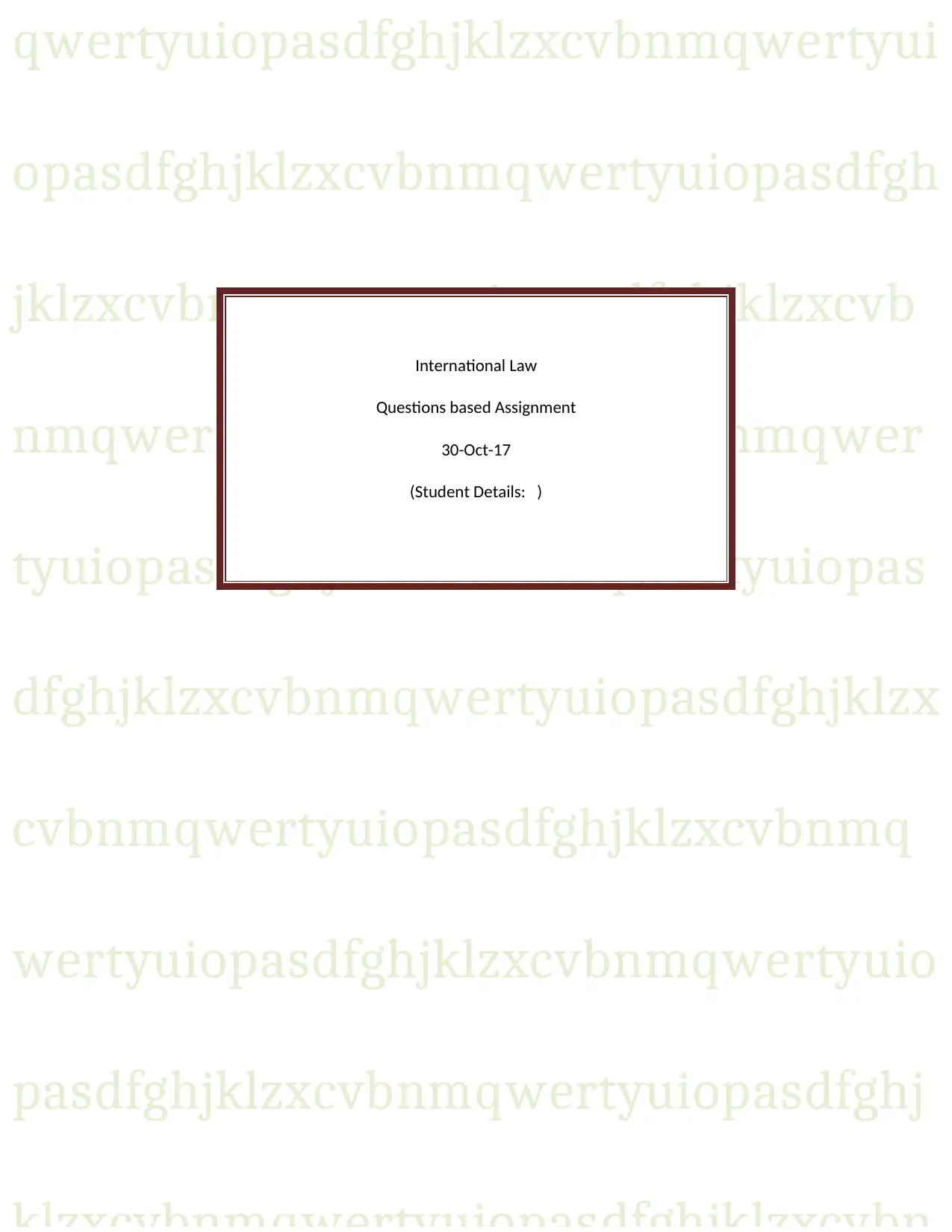
qwertyuiopasdfghjklzxcvbnmqwertyui
opasdfghjklzxcvbnmqwertyuiopasdfgh
jklzxcvbnmqwertyuiopasdfghjklzxcvb
nmqwertyuiopasdfghjklzxcvbnmqwer
tyuiopasdfghjklzxcvbnmqwertyuiopas
dfghjklzxcvbnmqwertyuiopasdfghjklzx
cvbnmqwertyuiopasdfghjklzxcvbnmq
wertyuiopasdfghjklzxcvbnmqwertyuio
pasdfghjklzxcvbnmqwertyuiopasdfghj
International Law
Questions based Assignment
30-Oct-17
(Student Details: )
opasdfghjklzxcvbnmqwertyuiopasdfgh
jklzxcvbnmqwertyuiopasdfghjklzxcvb
nmqwertyuiopasdfghjklzxcvbnmqwer
tyuiopasdfghjklzxcvbnmqwertyuiopas
dfghjklzxcvbnmqwertyuiopasdfghjklzx
cvbnmqwertyuiopasdfghjklzxcvbnmq
wertyuiopasdfghjklzxcvbnmqwertyuio
pasdfghjklzxcvbnmqwertyuiopasdfghj
International Law
Questions based Assignment
30-Oct-17
(Student Details: )
Paraphrase This Document
Need a fresh take? Get an instant paraphrase of this document with our AI Paraphraser
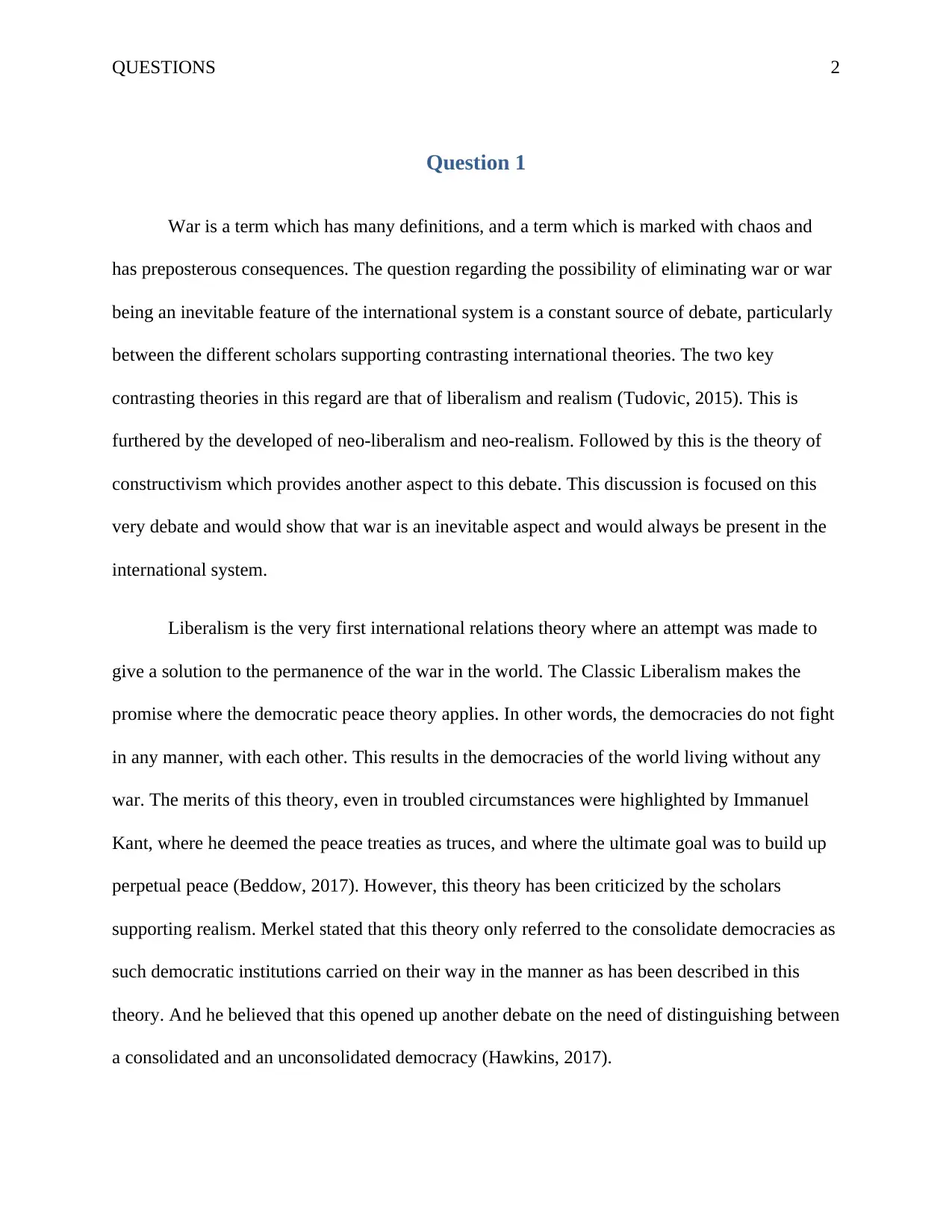
QUESTIONS 2
Question 1
War is a term which has many definitions, and a term which is marked with chaos and
has preposterous consequences. The question regarding the possibility of eliminating war or war
being an inevitable feature of the international system is a constant source of debate, particularly
between the different scholars supporting contrasting international theories. The two key
contrasting theories in this regard are that of liberalism and realism (Tudovic, 2015). This is
furthered by the developed of neo-liberalism and neo-realism. Followed by this is the theory of
constructivism which provides another aspect to this debate. This discussion is focused on this
very debate and would show that war is an inevitable aspect and would always be present in the
international system.
Liberalism is the very first international relations theory where an attempt was made to
give a solution to the permanence of the war in the world. The Classic Liberalism makes the
promise where the democratic peace theory applies. In other words, the democracies do not fight
in any manner, with each other. This results in the democracies of the world living without any
war. The merits of this theory, even in troubled circumstances were highlighted by Immanuel
Kant, where he deemed the peace treaties as truces, and where the ultimate goal was to build up
perpetual peace (Beddow, 2017). However, this theory has been criticized by the scholars
supporting realism. Merkel stated that this theory only referred to the consolidate democracies as
such democratic institutions carried on their way in the manner as has been described in this
theory. And he believed that this opened up another debate on the need of distinguishing between
a consolidated and an unconsolidated democracy (Hawkins, 2017).
Question 1
War is a term which has many definitions, and a term which is marked with chaos and
has preposterous consequences. The question regarding the possibility of eliminating war or war
being an inevitable feature of the international system is a constant source of debate, particularly
between the different scholars supporting contrasting international theories. The two key
contrasting theories in this regard are that of liberalism and realism (Tudovic, 2015). This is
furthered by the developed of neo-liberalism and neo-realism. Followed by this is the theory of
constructivism which provides another aspect to this debate. This discussion is focused on this
very debate and would show that war is an inevitable aspect and would always be present in the
international system.
Liberalism is the very first international relations theory where an attempt was made to
give a solution to the permanence of the war in the world. The Classic Liberalism makes the
promise where the democratic peace theory applies. In other words, the democracies do not fight
in any manner, with each other. This results in the democracies of the world living without any
war. The merits of this theory, even in troubled circumstances were highlighted by Immanuel
Kant, where he deemed the peace treaties as truces, and where the ultimate goal was to build up
perpetual peace (Beddow, 2017). However, this theory has been criticized by the scholars
supporting realism. Merkel stated that this theory only referred to the consolidate democracies as
such democratic institutions carried on their way in the manner as has been described in this
theory. And he believed that this opened up another debate on the need of distinguishing between
a consolidated and an unconsolidated democracy (Hawkins, 2017).
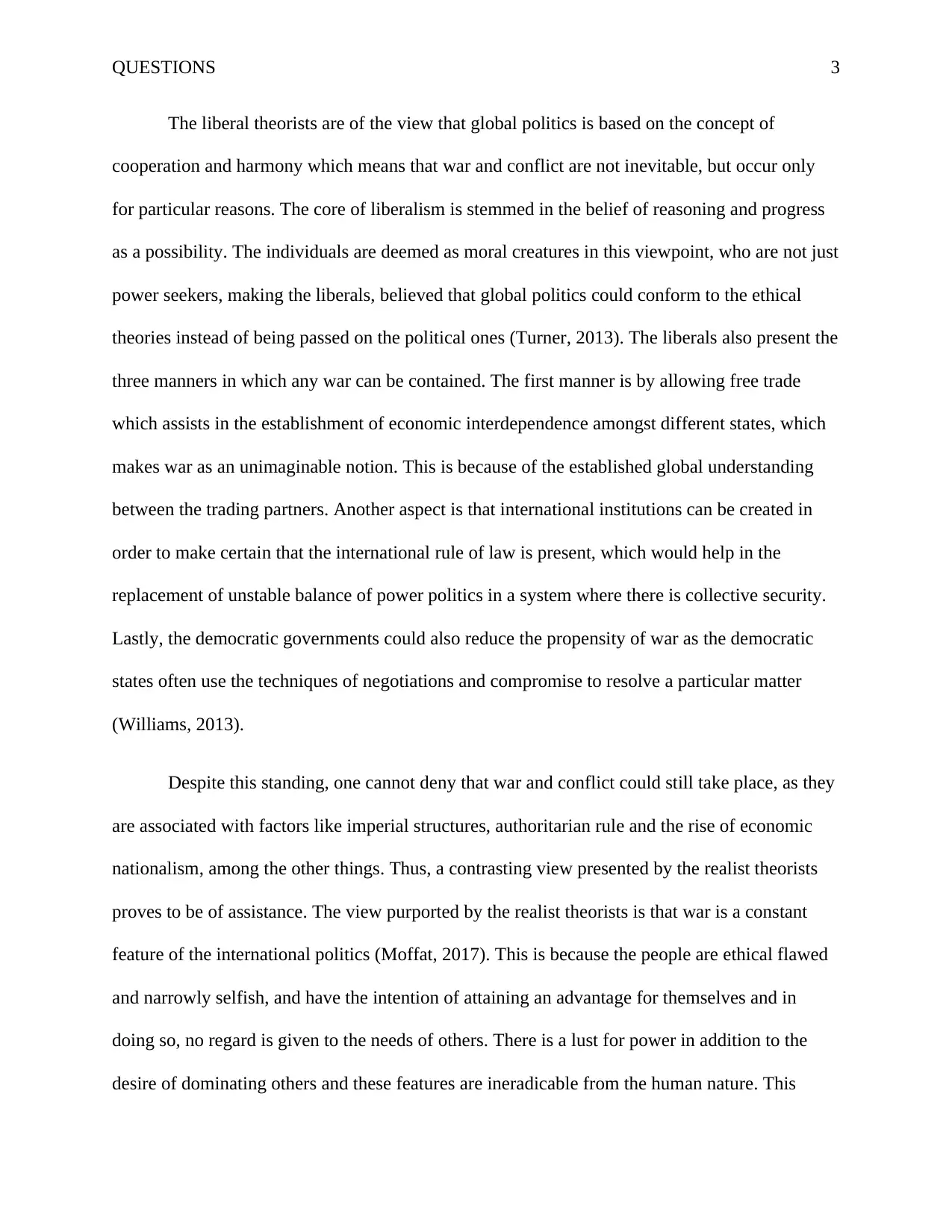
QUESTIONS 3
The liberal theorists are of the view that global politics is based on the concept of
cooperation and harmony which means that war and conflict are not inevitable, but occur only
for particular reasons. The core of liberalism is stemmed in the belief of reasoning and progress
as a possibility. The individuals are deemed as moral creatures in this viewpoint, who are not just
power seekers, making the liberals, believed that global politics could conform to the ethical
theories instead of being passed on the political ones (Turner, 2013). The liberals also present the
three manners in which any war can be contained. The first manner is by allowing free trade
which assists in the establishment of economic interdependence amongst different states, which
makes war as an unimaginable notion. This is because of the established global understanding
between the trading partners. Another aspect is that international institutions can be created in
order to make certain that the international rule of law is present, which would help in the
replacement of unstable balance of power politics in a system where there is collective security.
Lastly, the democratic governments could also reduce the propensity of war as the democratic
states often use the techniques of negotiations and compromise to resolve a particular matter
(Williams, 2013).
Despite this standing, one cannot deny that war and conflict could still take place, as they
are associated with factors like imperial structures, authoritarian rule and the rise of economic
nationalism, among the other things. Thus, a contrasting view presented by the realist theorists
proves to be of assistance. The view purported by the realist theorists is that war is a constant
feature of the international politics (Moffat, 2017). This is because the people are ethical flawed
and narrowly selfish, and have the intention of attaining an advantage for themselves and in
doing so, no regard is given to the needs of others. There is a lust for power in addition to the
desire of dominating others and these features are ineradicable from the human nature. This
The liberal theorists are of the view that global politics is based on the concept of
cooperation and harmony which means that war and conflict are not inevitable, but occur only
for particular reasons. The core of liberalism is stemmed in the belief of reasoning and progress
as a possibility. The individuals are deemed as moral creatures in this viewpoint, who are not just
power seekers, making the liberals, believed that global politics could conform to the ethical
theories instead of being passed on the political ones (Turner, 2013). The liberals also present the
three manners in which any war can be contained. The first manner is by allowing free trade
which assists in the establishment of economic interdependence amongst different states, which
makes war as an unimaginable notion. This is because of the established global understanding
between the trading partners. Another aspect is that international institutions can be created in
order to make certain that the international rule of law is present, which would help in the
replacement of unstable balance of power politics in a system where there is collective security.
Lastly, the democratic governments could also reduce the propensity of war as the democratic
states often use the techniques of negotiations and compromise to resolve a particular matter
(Williams, 2013).
Despite this standing, one cannot deny that war and conflict could still take place, as they
are associated with factors like imperial structures, authoritarian rule and the rise of economic
nationalism, among the other things. Thus, a contrasting view presented by the realist theorists
proves to be of assistance. The view purported by the realist theorists is that war is a constant
feature of the international politics (Moffat, 2017). This is because the people are ethical flawed
and narrowly selfish, and have the intention of attaining an advantage for themselves and in
doing so, no regard is given to the needs of others. There is a lust for power in addition to the
desire of dominating others and these features are ineradicable from the human nature. This
⊘ This is a preview!⊘
Do you want full access?
Subscribe today to unlock all pages.

Trusted by 1+ million students worldwide
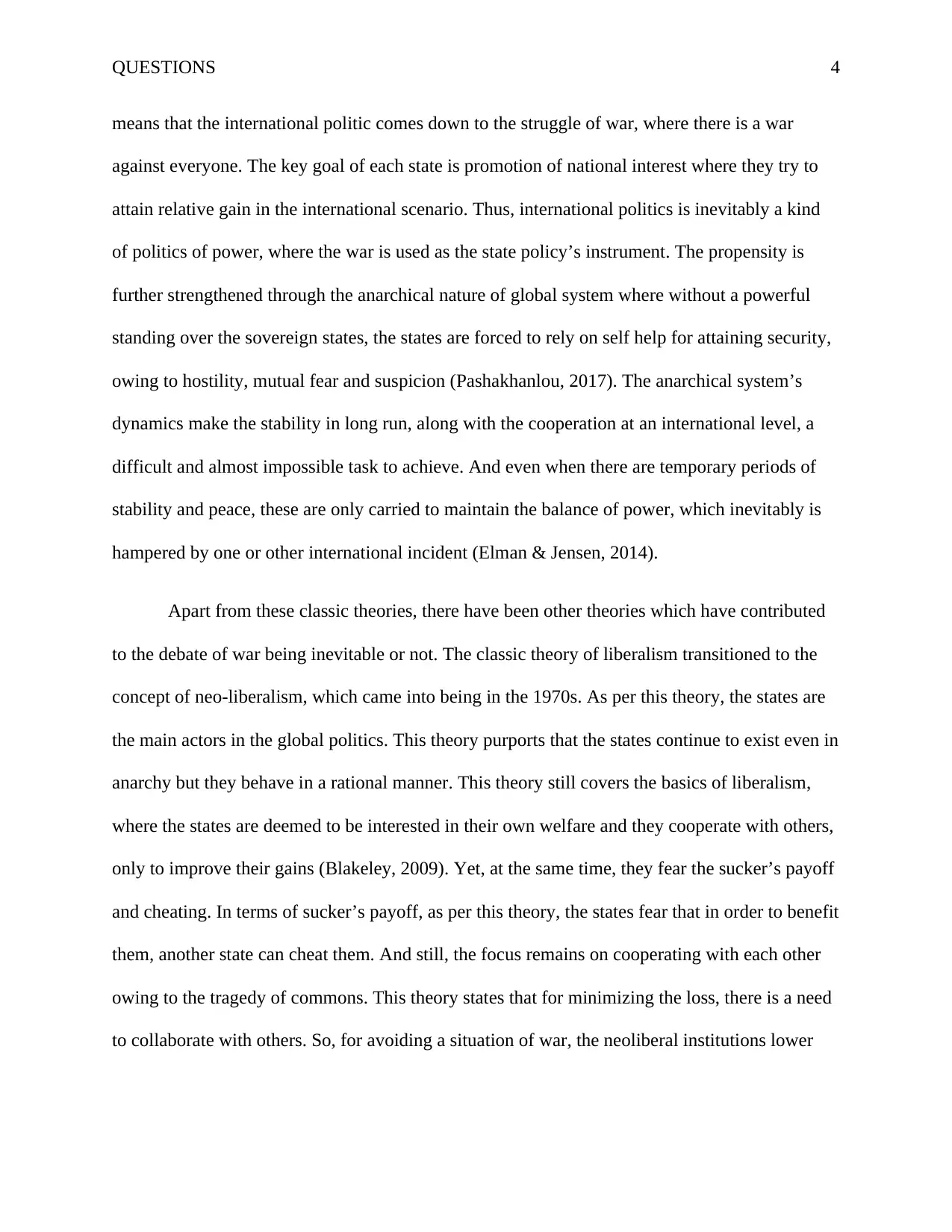
QUESTIONS 4
means that the international politic comes down to the struggle of war, where there is a war
against everyone. The key goal of each state is promotion of national interest where they try to
attain relative gain in the international scenario. Thus, international politics is inevitably a kind
of politics of power, where the war is used as the state policy’s instrument. The propensity is
further strengthened through the anarchical nature of global system where without a powerful
standing over the sovereign states, the states are forced to rely on self help for attaining security,
owing to hostility, mutual fear and suspicion (Pashakhanlou, 2017). The anarchical system’s
dynamics make the stability in long run, along with the cooperation at an international level, a
difficult and almost impossible task to achieve. And even when there are temporary periods of
stability and peace, these are only carried to maintain the balance of power, which inevitably is
hampered by one or other international incident (Elman & Jensen, 2014).
Apart from these classic theories, there have been other theories which have contributed
to the debate of war being inevitable or not. The classic theory of liberalism transitioned to the
concept of neo-liberalism, which came into being in the 1970s. As per this theory, the states are
the main actors in the global politics. This theory purports that the states continue to exist even in
anarchy but they behave in a rational manner. This theory still covers the basics of liberalism,
where the states are deemed to be interested in their own welfare and they cooperate with others,
only to improve their gains (Blakeley, 2009). Yet, at the same time, they fear the sucker’s payoff
and cheating. In terms of sucker’s payoff, as per this theory, the states fear that in order to benefit
them, another state can cheat them. And still, the focus remains on cooperating with each other
owing to the tragedy of commons. This theory states that for minimizing the loss, there is a need
to collaborate with others. So, for avoiding a situation of war, the neoliberal institutions lower
means that the international politic comes down to the struggle of war, where there is a war
against everyone. The key goal of each state is promotion of national interest where they try to
attain relative gain in the international scenario. Thus, international politics is inevitably a kind
of politics of power, where the war is used as the state policy’s instrument. The propensity is
further strengthened through the anarchical nature of global system where without a powerful
standing over the sovereign states, the states are forced to rely on self help for attaining security,
owing to hostility, mutual fear and suspicion (Pashakhanlou, 2017). The anarchical system’s
dynamics make the stability in long run, along with the cooperation at an international level, a
difficult and almost impossible task to achieve. And even when there are temporary periods of
stability and peace, these are only carried to maintain the balance of power, which inevitably is
hampered by one or other international incident (Elman & Jensen, 2014).
Apart from these classic theories, there have been other theories which have contributed
to the debate of war being inevitable or not. The classic theory of liberalism transitioned to the
concept of neo-liberalism, which came into being in the 1970s. As per this theory, the states are
the main actors in the global politics. This theory purports that the states continue to exist even in
anarchy but they behave in a rational manner. This theory still covers the basics of liberalism,
where the states are deemed to be interested in their own welfare and they cooperate with others,
only to improve their gains (Blakeley, 2009). Yet, at the same time, they fear the sucker’s payoff
and cheating. In terms of sucker’s payoff, as per this theory, the states fear that in order to benefit
them, another state can cheat them. And still, the focus remains on cooperating with each other
owing to the tragedy of commons. This theory states that for minimizing the loss, there is a need
to collaborate with others. So, for avoiding a situation of war, the neoliberal institutions lower
Paraphrase This Document
Need a fresh take? Get an instant paraphrase of this document with our AI Paraphraser
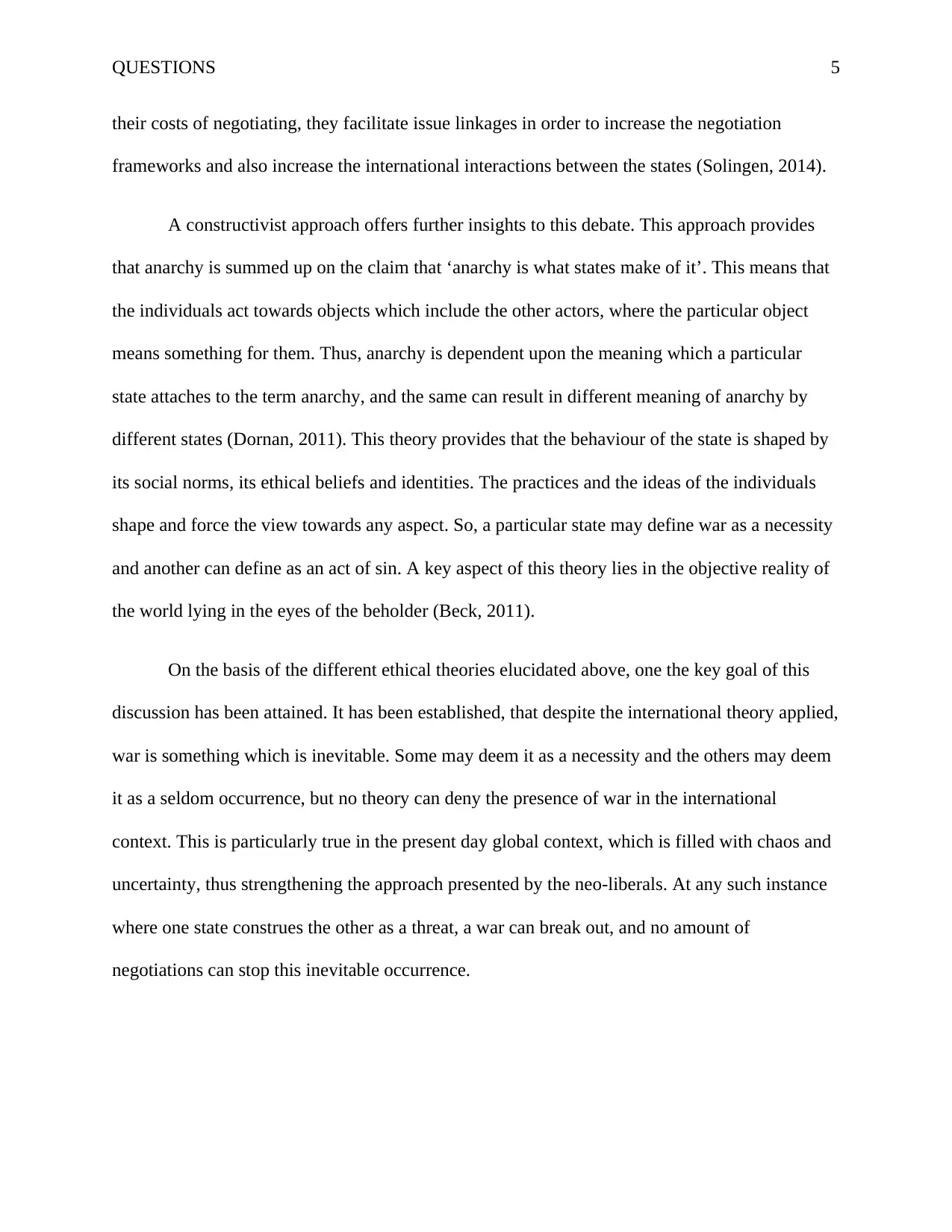
QUESTIONS 5
their costs of negotiating, they facilitate issue linkages in order to increase the negotiation
frameworks and also increase the international interactions between the states (Solingen, 2014).
A constructivist approach offers further insights to this debate. This approach provides
that anarchy is summed up on the claim that ‘anarchy is what states make of it’. This means that
the individuals act towards objects which include the other actors, where the particular object
means something for them. Thus, anarchy is dependent upon the meaning which a particular
state attaches to the term anarchy, and the same can result in different meaning of anarchy by
different states (Dornan, 2011). This theory provides that the behaviour of the state is shaped by
its social norms, its ethical beliefs and identities. The practices and the ideas of the individuals
shape and force the view towards any aspect. So, a particular state may define war as a necessity
and another can define as an act of sin. A key aspect of this theory lies in the objective reality of
the world lying in the eyes of the beholder (Beck, 2011).
On the basis of the different ethical theories elucidated above, one the key goal of this
discussion has been attained. It has been established, that despite the international theory applied,
war is something which is inevitable. Some may deem it as a necessity and the others may deem
it as a seldom occurrence, but no theory can deny the presence of war in the international
context. This is particularly true in the present day global context, which is filled with chaos and
uncertainty, thus strengthening the approach presented by the neo-liberals. At any such instance
where one state construes the other as a threat, a war can break out, and no amount of
negotiations can stop this inevitable occurrence.
their costs of negotiating, they facilitate issue linkages in order to increase the negotiation
frameworks and also increase the international interactions between the states (Solingen, 2014).
A constructivist approach offers further insights to this debate. This approach provides
that anarchy is summed up on the claim that ‘anarchy is what states make of it’. This means that
the individuals act towards objects which include the other actors, where the particular object
means something for them. Thus, anarchy is dependent upon the meaning which a particular
state attaches to the term anarchy, and the same can result in different meaning of anarchy by
different states (Dornan, 2011). This theory provides that the behaviour of the state is shaped by
its social norms, its ethical beliefs and identities. The practices and the ideas of the individuals
shape and force the view towards any aspect. So, a particular state may define war as a necessity
and another can define as an act of sin. A key aspect of this theory lies in the objective reality of
the world lying in the eyes of the beholder (Beck, 2011).
On the basis of the different ethical theories elucidated above, one the key goal of this
discussion has been attained. It has been established, that despite the international theory applied,
war is something which is inevitable. Some may deem it as a necessity and the others may deem
it as a seldom occurrence, but no theory can deny the presence of war in the international
context. This is particularly true in the present day global context, which is filled with chaos and
uncertainty, thus strengthening the approach presented by the neo-liberals. At any such instance
where one state construes the other as a threat, a war can break out, and no amount of
negotiations can stop this inevitable occurrence.
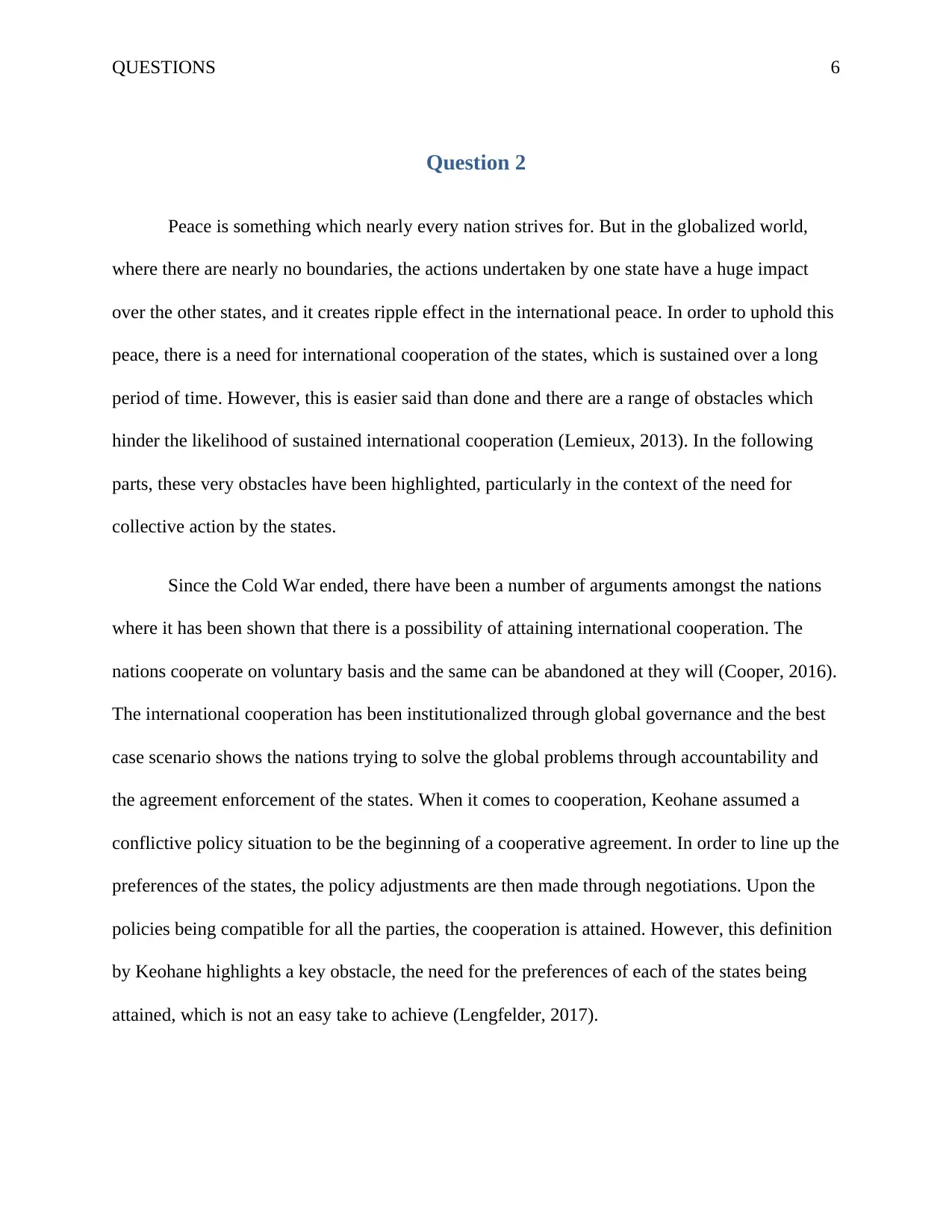
QUESTIONS 6
Question 2
Peace is something which nearly every nation strives for. But in the globalized world,
where there are nearly no boundaries, the actions undertaken by one state have a huge impact
over the other states, and it creates ripple effect in the international peace. In order to uphold this
peace, there is a need for international cooperation of the states, which is sustained over a long
period of time. However, this is easier said than done and there are a range of obstacles which
hinder the likelihood of sustained international cooperation (Lemieux, 2013). In the following
parts, these very obstacles have been highlighted, particularly in the context of the need for
collective action by the states.
Since the Cold War ended, there have been a number of arguments amongst the nations
where it has been shown that there is a possibility of attaining international cooperation. The
nations cooperate on voluntary basis and the same can be abandoned at they will (Cooper, 2016).
The international cooperation has been institutionalized through global governance and the best
case scenario shows the nations trying to solve the global problems through accountability and
the agreement enforcement of the states. When it comes to cooperation, Keohane assumed a
conflictive policy situation to be the beginning of a cooperative agreement. In order to line up the
preferences of the states, the policy adjustments are then made through negotiations. Upon the
policies being compatible for all the parties, the cooperation is attained. However, this definition
by Keohane highlights a key obstacle, the need for the preferences of each of the states being
attained, which is not an easy take to achieve (Lengfelder, 2017).
Question 2
Peace is something which nearly every nation strives for. But in the globalized world,
where there are nearly no boundaries, the actions undertaken by one state have a huge impact
over the other states, and it creates ripple effect in the international peace. In order to uphold this
peace, there is a need for international cooperation of the states, which is sustained over a long
period of time. However, this is easier said than done and there are a range of obstacles which
hinder the likelihood of sustained international cooperation (Lemieux, 2013). In the following
parts, these very obstacles have been highlighted, particularly in the context of the need for
collective action by the states.
Since the Cold War ended, there have been a number of arguments amongst the nations
where it has been shown that there is a possibility of attaining international cooperation. The
nations cooperate on voluntary basis and the same can be abandoned at they will (Cooper, 2016).
The international cooperation has been institutionalized through global governance and the best
case scenario shows the nations trying to solve the global problems through accountability and
the agreement enforcement of the states. When it comes to cooperation, Keohane assumed a
conflictive policy situation to be the beginning of a cooperative agreement. In order to line up the
preferences of the states, the policy adjustments are then made through negotiations. Upon the
policies being compatible for all the parties, the cooperation is attained. However, this definition
by Keohane highlights a key obstacle, the need for the preferences of each of the states being
attained, which is not an easy take to achieve (Lengfelder, 2017).
⊘ This is a preview!⊘
Do you want full access?
Subscribe today to unlock all pages.

Trusted by 1+ million students worldwide
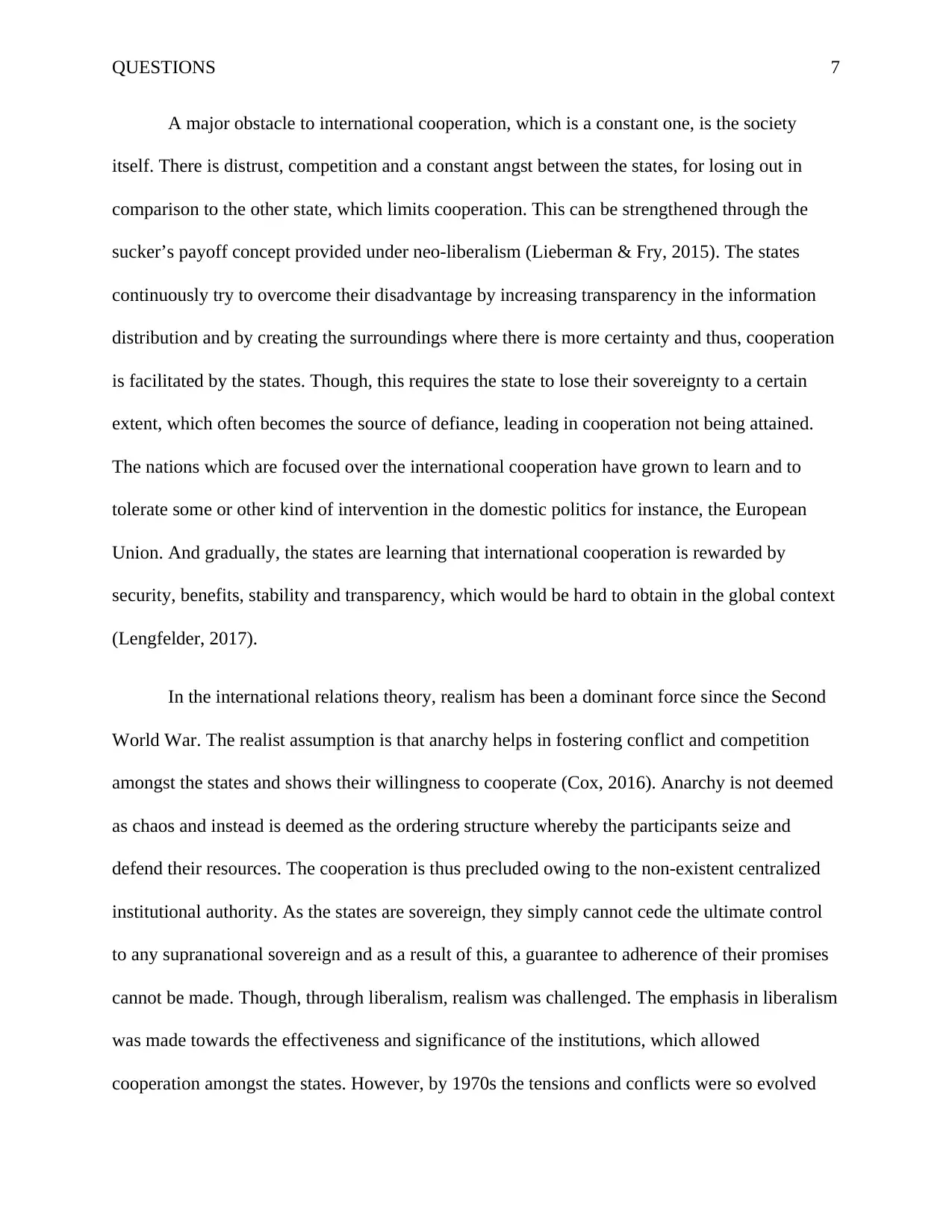
QUESTIONS 7
A major obstacle to international cooperation, which is a constant one, is the society
itself. There is distrust, competition and a constant angst between the states, for losing out in
comparison to the other state, which limits cooperation. This can be strengthened through the
sucker’s payoff concept provided under neo-liberalism (Lieberman & Fry, 2015). The states
continuously try to overcome their disadvantage by increasing transparency in the information
distribution and by creating the surroundings where there is more certainty and thus, cooperation
is facilitated by the states. Though, this requires the state to lose their sovereignty to a certain
extent, which often becomes the source of defiance, leading in cooperation not being attained.
The nations which are focused over the international cooperation have grown to learn and to
tolerate some or other kind of intervention in the domestic politics for instance, the European
Union. And gradually, the states are learning that international cooperation is rewarded by
security, benefits, stability and transparency, which would be hard to obtain in the global context
(Lengfelder, 2017).
In the international relations theory, realism has been a dominant force since the Second
World War. The realist assumption is that anarchy helps in fostering conflict and competition
amongst the states and shows their willingness to cooperate (Cox, 2016). Anarchy is not deemed
as chaos and instead is deemed as the ordering structure whereby the participants seize and
defend their resources. The cooperation is thus precluded owing to the non-existent centralized
institutional authority. As the states are sovereign, they simply cannot cede the ultimate control
to any supranational sovereign and as a result of this, a guarantee to adherence of their promises
cannot be made. Though, through liberalism, realism was challenged. The emphasis in liberalism
was made towards the effectiveness and significance of the institutions, which allowed
cooperation amongst the states. However, by 1970s the tensions and conflicts were so evolved
A major obstacle to international cooperation, which is a constant one, is the society
itself. There is distrust, competition and a constant angst between the states, for losing out in
comparison to the other state, which limits cooperation. This can be strengthened through the
sucker’s payoff concept provided under neo-liberalism (Lieberman & Fry, 2015). The states
continuously try to overcome their disadvantage by increasing transparency in the information
distribution and by creating the surroundings where there is more certainty and thus, cooperation
is facilitated by the states. Though, this requires the state to lose their sovereignty to a certain
extent, which often becomes the source of defiance, leading in cooperation not being attained.
The nations which are focused over the international cooperation have grown to learn and to
tolerate some or other kind of intervention in the domestic politics for instance, the European
Union. And gradually, the states are learning that international cooperation is rewarded by
security, benefits, stability and transparency, which would be hard to obtain in the global context
(Lengfelder, 2017).
In the international relations theory, realism has been a dominant force since the Second
World War. The realist assumption is that anarchy helps in fostering conflict and competition
amongst the states and shows their willingness to cooperate (Cox, 2016). Anarchy is not deemed
as chaos and instead is deemed as the ordering structure whereby the participants seize and
defend their resources. The cooperation is thus precluded owing to the non-existent centralized
institutional authority. As the states are sovereign, they simply cannot cede the ultimate control
to any supranational sovereign and as a result of this, a guarantee to adherence of their promises
cannot be made. Though, through liberalism, realism was challenged. The emphasis in liberalism
was made towards the effectiveness and significance of the institutions, which allowed
cooperation amongst the states. However, by 1970s the tensions and conflicts were so evolved
Paraphrase This Document
Need a fresh take? Get an instant paraphrase of this document with our AI Paraphraser
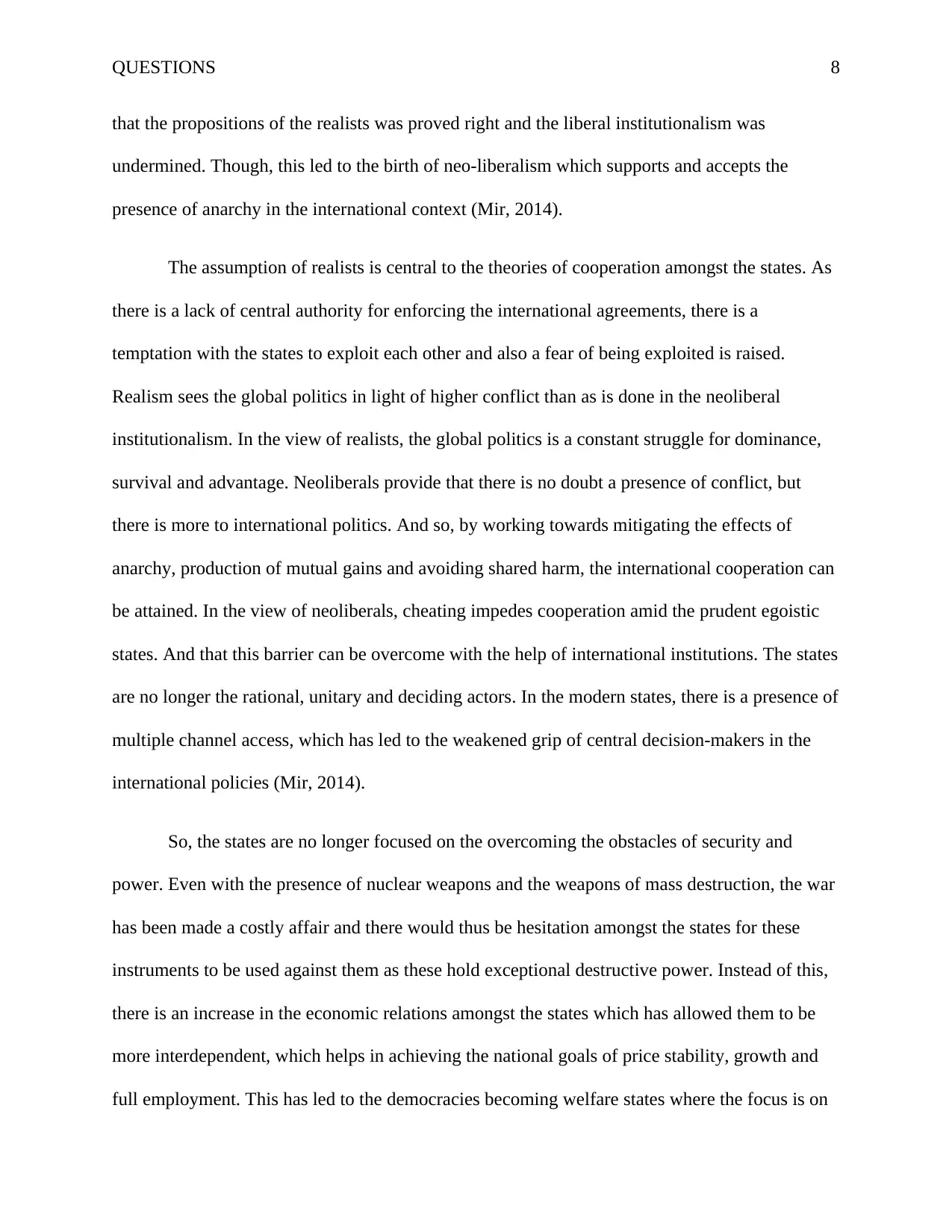
QUESTIONS 8
that the propositions of the realists was proved right and the liberal institutionalism was
undermined. Though, this led to the birth of neo-liberalism which supports and accepts the
presence of anarchy in the international context (Mir, 2014).
The assumption of realists is central to the theories of cooperation amongst the states. As
there is a lack of central authority for enforcing the international agreements, there is a
temptation with the states to exploit each other and also a fear of being exploited is raised.
Realism sees the global politics in light of higher conflict than as is done in the neoliberal
institutionalism. In the view of realists, the global politics is a constant struggle for dominance,
survival and advantage. Neoliberals provide that there is no doubt a presence of conflict, but
there is more to international politics. And so, by working towards mitigating the effects of
anarchy, production of mutual gains and avoiding shared harm, the international cooperation can
be attained. In the view of neoliberals, cheating impedes cooperation amid the prudent egoistic
states. And that this barrier can be overcome with the help of international institutions. The states
are no longer the rational, unitary and deciding actors. In the modern states, there is a presence of
multiple channel access, which has led to the weakened grip of central decision-makers in the
international policies (Mir, 2014).
So, the states are no longer focused on the overcoming the obstacles of security and
power. Even with the presence of nuclear weapons and the weapons of mass destruction, the war
has been made a costly affair and there would thus be hesitation amongst the states for these
instruments to be used against them as these hold exceptional destructive power. Instead of this,
there is an increase in the economic relations amongst the states which has allowed them to be
more interdependent, which helps in achieving the national goals of price stability, growth and
full employment. This has led to the democracies becoming welfare states where the focus is on
that the propositions of the realists was proved right and the liberal institutionalism was
undermined. Though, this led to the birth of neo-liberalism which supports and accepts the
presence of anarchy in the international context (Mir, 2014).
The assumption of realists is central to the theories of cooperation amongst the states. As
there is a lack of central authority for enforcing the international agreements, there is a
temptation with the states to exploit each other and also a fear of being exploited is raised.
Realism sees the global politics in light of higher conflict than as is done in the neoliberal
institutionalism. In the view of realists, the global politics is a constant struggle for dominance,
survival and advantage. Neoliberals provide that there is no doubt a presence of conflict, but
there is more to international politics. And so, by working towards mitigating the effects of
anarchy, production of mutual gains and avoiding shared harm, the international cooperation can
be attained. In the view of neoliberals, cheating impedes cooperation amid the prudent egoistic
states. And that this barrier can be overcome with the help of international institutions. The states
are no longer the rational, unitary and deciding actors. In the modern states, there is a presence of
multiple channel access, which has led to the weakened grip of central decision-makers in the
international policies (Mir, 2014).
So, the states are no longer focused on the overcoming the obstacles of security and
power. Even with the presence of nuclear weapons and the weapons of mass destruction, the war
has been made a costly affair and there would thus be hesitation amongst the states for these
instruments to be used against them as these hold exceptional destructive power. Instead of this,
there is an increase in the economic relations amongst the states which has allowed them to be
more interdependent, which helps in achieving the national goals of price stability, growth and
full employment. This has led to the democracies becoming welfare states where the focus is on
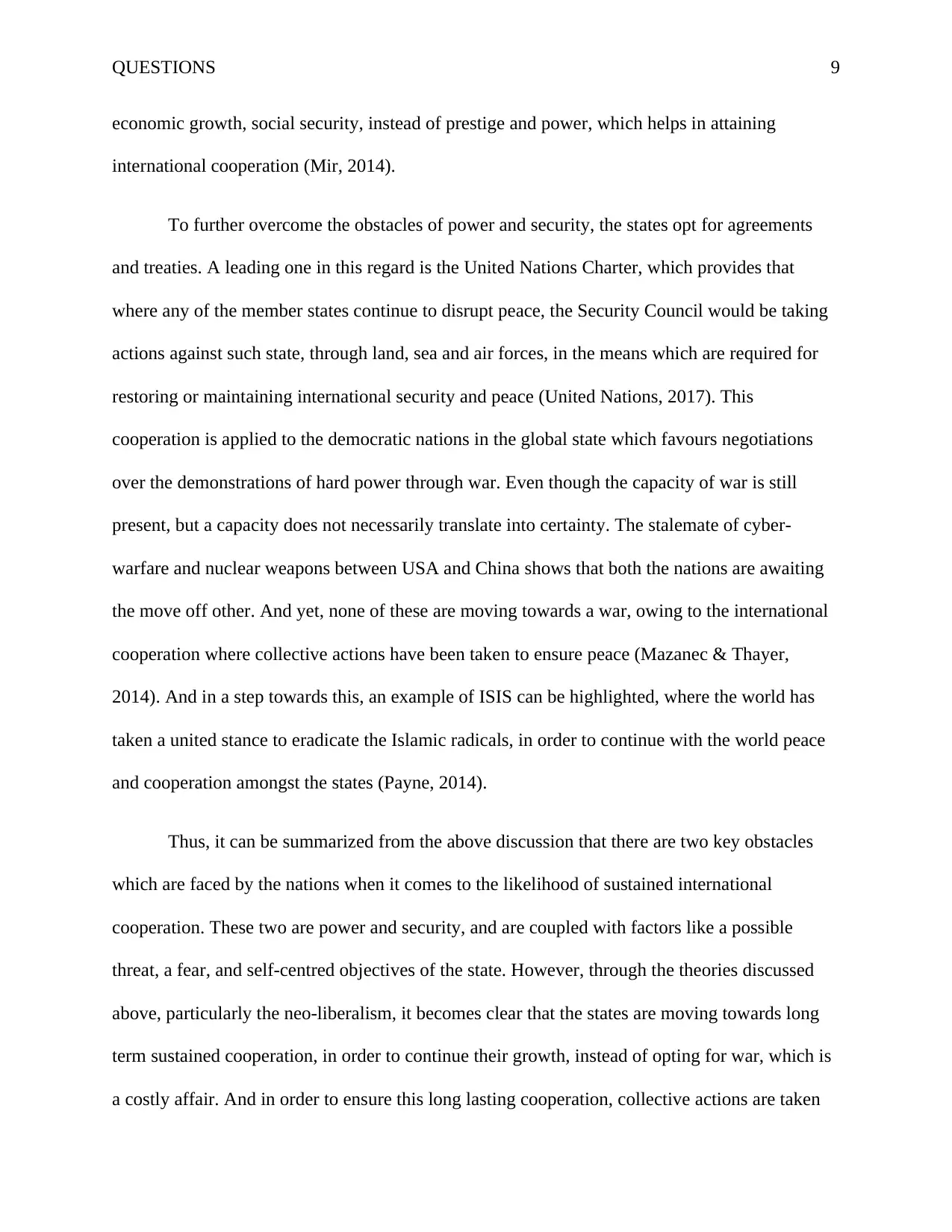
QUESTIONS 9
economic growth, social security, instead of prestige and power, which helps in attaining
international cooperation (Mir, 2014).
To further overcome the obstacles of power and security, the states opt for agreements
and treaties. A leading one in this regard is the United Nations Charter, which provides that
where any of the member states continue to disrupt peace, the Security Council would be taking
actions against such state, through land, sea and air forces, in the means which are required for
restoring or maintaining international security and peace (United Nations, 2017). This
cooperation is applied to the democratic nations in the global state which favours negotiations
over the demonstrations of hard power through war. Even though the capacity of war is still
present, but a capacity does not necessarily translate into certainty. The stalemate of cyber-
warfare and nuclear weapons between USA and China shows that both the nations are awaiting
the move off other. And yet, none of these are moving towards a war, owing to the international
cooperation where collective actions have been taken to ensure peace (Mazanec & Thayer,
2014). And in a step towards this, an example of ISIS can be highlighted, where the world has
taken a united stance to eradicate the Islamic radicals, in order to continue with the world peace
and cooperation amongst the states (Payne, 2014).
Thus, it can be summarized from the above discussion that there are two key obstacles
which are faced by the nations when it comes to the likelihood of sustained international
cooperation. These two are power and security, and are coupled with factors like a possible
threat, a fear, and self-centred objectives of the state. However, through the theories discussed
above, particularly the neo-liberalism, it becomes clear that the states are moving towards long
term sustained cooperation, in order to continue their growth, instead of opting for war, which is
a costly affair. And in order to ensure this long lasting cooperation, collective actions are taken
economic growth, social security, instead of prestige and power, which helps in attaining
international cooperation (Mir, 2014).
To further overcome the obstacles of power and security, the states opt for agreements
and treaties. A leading one in this regard is the United Nations Charter, which provides that
where any of the member states continue to disrupt peace, the Security Council would be taking
actions against such state, through land, sea and air forces, in the means which are required for
restoring or maintaining international security and peace (United Nations, 2017). This
cooperation is applied to the democratic nations in the global state which favours negotiations
over the demonstrations of hard power through war. Even though the capacity of war is still
present, but a capacity does not necessarily translate into certainty. The stalemate of cyber-
warfare and nuclear weapons between USA and China shows that both the nations are awaiting
the move off other. And yet, none of these are moving towards a war, owing to the international
cooperation where collective actions have been taken to ensure peace (Mazanec & Thayer,
2014). And in a step towards this, an example of ISIS can be highlighted, where the world has
taken a united stance to eradicate the Islamic radicals, in order to continue with the world peace
and cooperation amongst the states (Payne, 2014).
Thus, it can be summarized from the above discussion that there are two key obstacles
which are faced by the nations when it comes to the likelihood of sustained international
cooperation. These two are power and security, and are coupled with factors like a possible
threat, a fear, and self-centred objectives of the state. However, through the theories discussed
above, particularly the neo-liberalism, it becomes clear that the states are moving towards long
term sustained cooperation, in order to continue their growth, instead of opting for war, which is
a costly affair. And in order to ensure this long lasting cooperation, collective actions are taken
⊘ This is a preview!⊘
Do you want full access?
Subscribe today to unlock all pages.

Trusted by 1+ million students worldwide
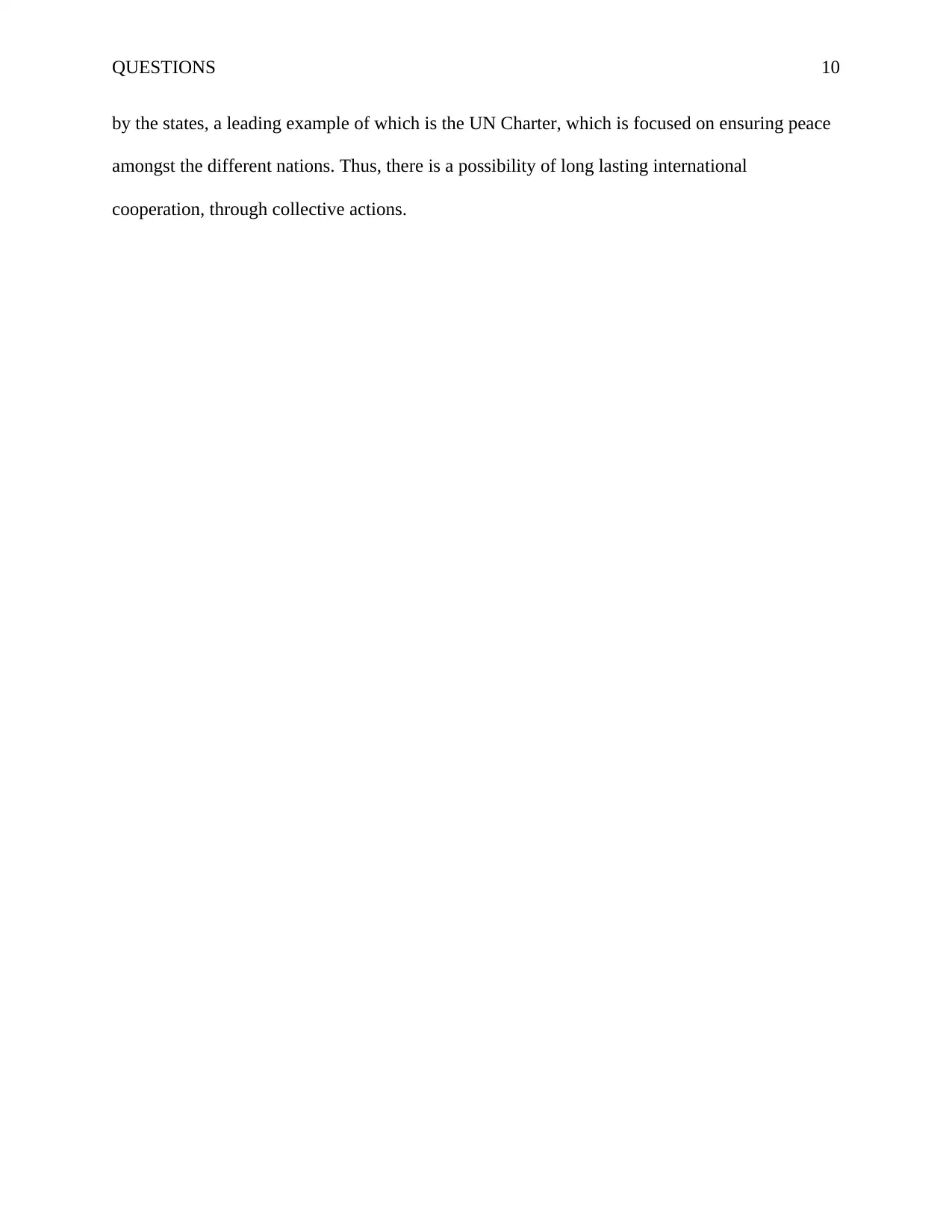
QUESTIONS 10
by the states, a leading example of which is the UN Charter, which is focused on ensuring peace
amongst the different nations. Thus, there is a possibility of long lasting international
cooperation, through collective actions.
by the states, a leading example of which is the UN Charter, which is focused on ensuring peace
amongst the different nations. Thus, there is a possibility of long lasting international
cooperation, through collective actions.
Paraphrase This Document
Need a fresh take? Get an instant paraphrase of this document with our AI Paraphraser
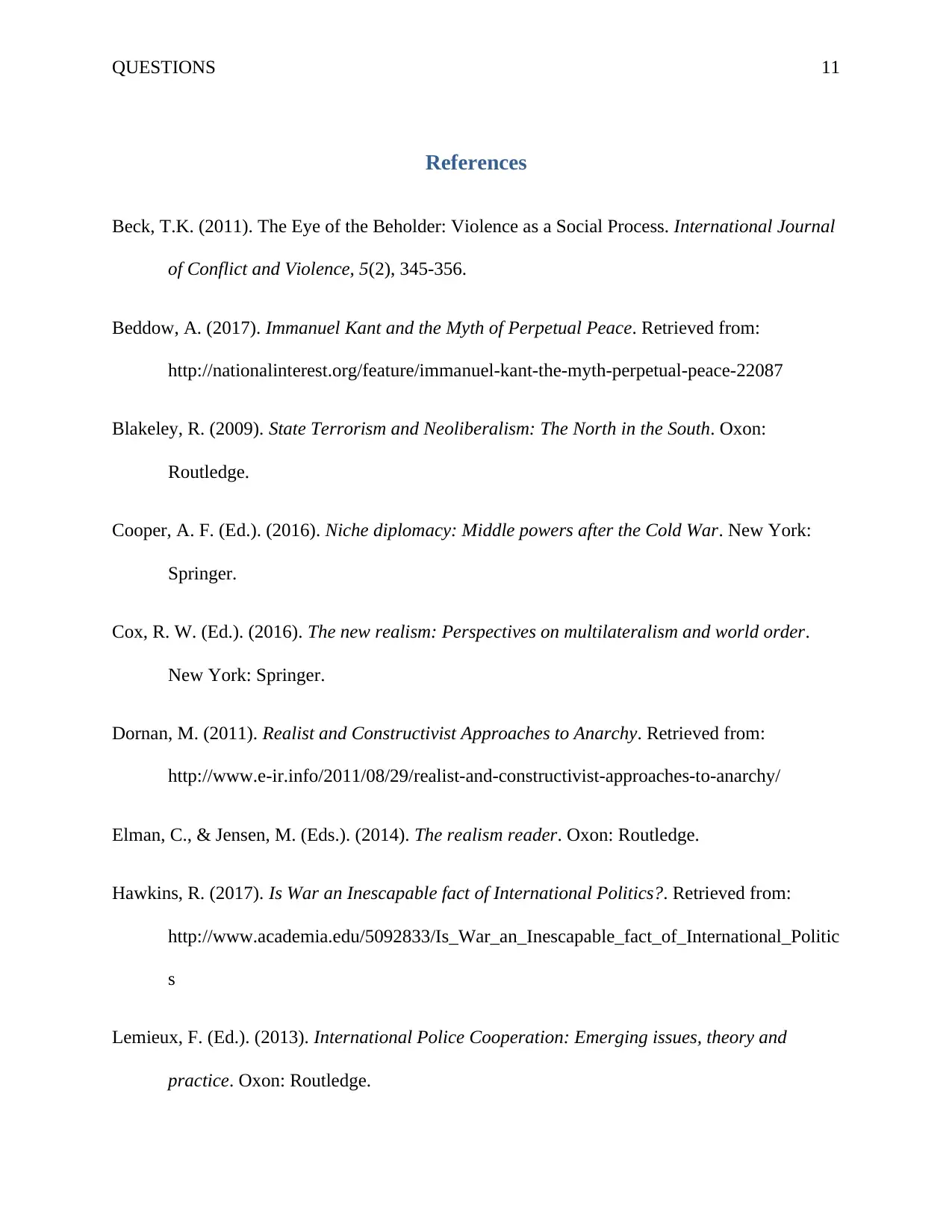
QUESTIONS 11
References
Beck, T.K. (2011). The Eye of the Beholder: Violence as a Social Process. International Journal
of Conflict and Violence, 5(2), 345-356.
Beddow, A. (2017). Immanuel Kant and the Myth of Perpetual Peace. Retrieved from:
http://nationalinterest.org/feature/immanuel-kant-the-myth-perpetual-peace-22087
Blakeley, R. (2009). State Terrorism and Neoliberalism: The North in the South. Oxon:
Routledge.
Cooper, A. F. (Ed.). (2016). Niche diplomacy: Middle powers after the Cold War. New York:
Springer.
Cox, R. W. (Ed.). (2016). The new realism: Perspectives on multilateralism and world order.
New York: Springer.
Dornan, M. (2011). Realist and Constructivist Approaches to Anarchy. Retrieved from:
http://www.e-ir.info/2011/08/29/realist-and-constructivist-approaches-to-anarchy/
Elman, C., & Jensen, M. (Eds.). (2014). The realism reader. Oxon: Routledge.
Hawkins, R. (2017). Is War an Inescapable fact of International Politics?. Retrieved from:
http://www.academia.edu/5092833/Is_War_an_Inescapable_fact_of_International_Politic
s
Lemieux, F. (Ed.). (2013). International Police Cooperation: Emerging issues, theory and
practice. Oxon: Routledge.
References
Beck, T.K. (2011). The Eye of the Beholder: Violence as a Social Process. International Journal
of Conflict and Violence, 5(2), 345-356.
Beddow, A. (2017). Immanuel Kant and the Myth of Perpetual Peace. Retrieved from:
http://nationalinterest.org/feature/immanuel-kant-the-myth-perpetual-peace-22087
Blakeley, R. (2009). State Terrorism and Neoliberalism: The North in the South. Oxon:
Routledge.
Cooper, A. F. (Ed.). (2016). Niche diplomacy: Middle powers after the Cold War. New York:
Springer.
Cox, R. W. (Ed.). (2016). The new realism: Perspectives on multilateralism and world order.
New York: Springer.
Dornan, M. (2011). Realist and Constructivist Approaches to Anarchy. Retrieved from:
http://www.e-ir.info/2011/08/29/realist-and-constructivist-approaches-to-anarchy/
Elman, C., & Jensen, M. (Eds.). (2014). The realism reader. Oxon: Routledge.
Hawkins, R. (2017). Is War an Inescapable fact of International Politics?. Retrieved from:
http://www.academia.edu/5092833/Is_War_an_Inescapable_fact_of_International_Politic
s
Lemieux, F. (Ed.). (2013). International Police Cooperation: Emerging issues, theory and
practice. Oxon: Routledge.
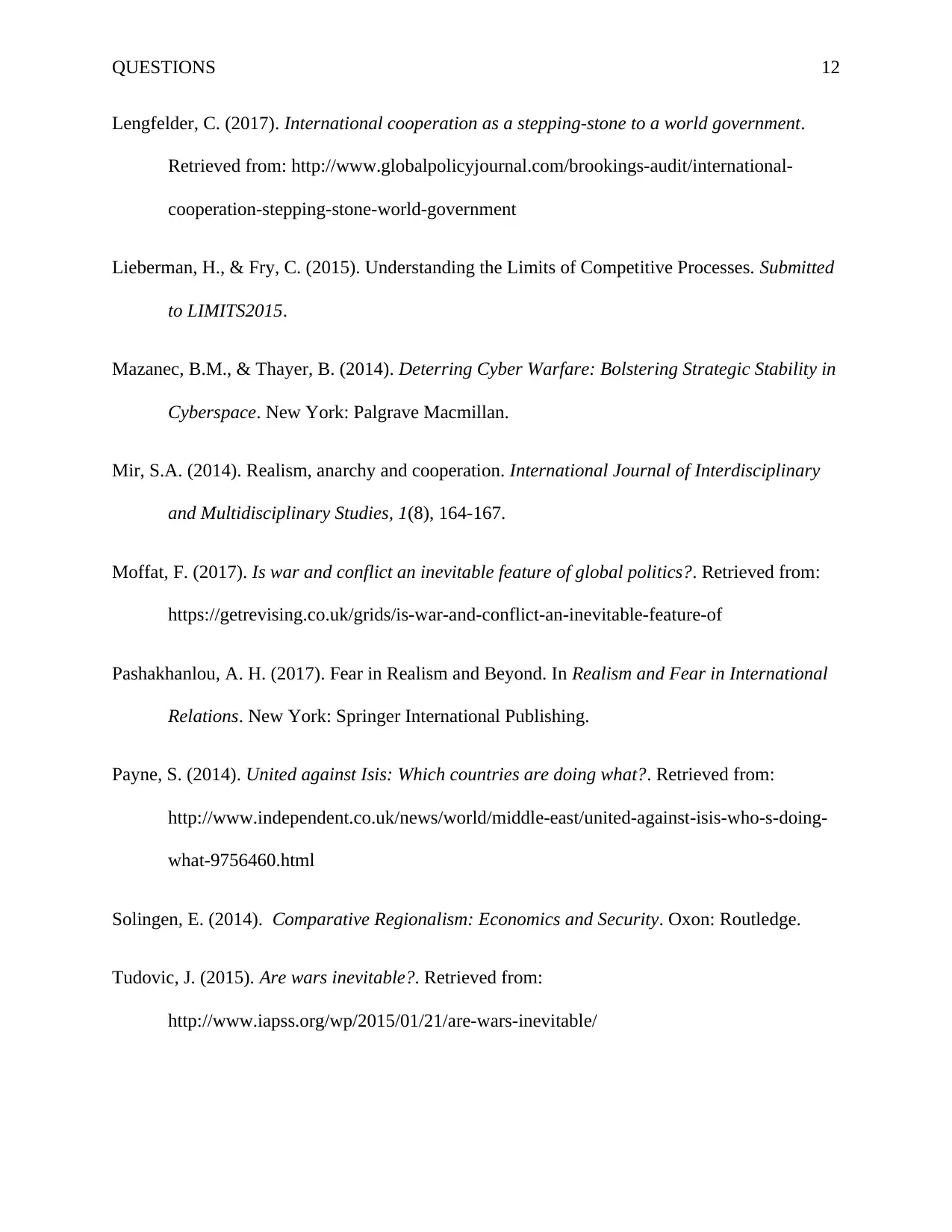
QUESTIONS 12
Lengfelder, C. (2017). International cooperation as a stepping-stone to a world government.
Retrieved from: http://www.globalpolicyjournal.com/brookings-audit/international-
cooperation-stepping-stone-world-government
Lieberman, H., & Fry, C. (2015). Understanding the Limits of Competitive Processes. Submitted
to LIMITS2015.
Mazanec, B.M., & Thayer, B. (2014). Deterring Cyber Warfare: Bolstering Strategic Stability in
Cyberspace. New York: Palgrave Macmillan.
Mir, S.A. (2014). Realism, anarchy and cooperation. International Journal of Interdisciplinary
and Multidisciplinary Studies, 1(8), 164-167.
Moffat, F. (2017). Is war and conflict an inevitable feature of global politics?. Retrieved from:
https://getrevising.co.uk/grids/is-war-and-conflict-an-inevitable-feature-of
Pashakhanlou, A. H. (2017). Fear in Realism and Beyond. In Realism and Fear in International
Relations. New York: Springer International Publishing.
Payne, S. (2014). United against Isis: Which countries are doing what?. Retrieved from:
http://www.independent.co.uk/news/world/middle-east/united-against-isis-who-s-doing-
what-9756460.html
Solingen, E. (2014). Comparative Regionalism: Economics and Security. Oxon: Routledge.
Tudovic, J. (2015). Are wars inevitable?. Retrieved from:
http://www.iapss.org/wp/2015/01/21/are-wars-inevitable/
Lengfelder, C. (2017). International cooperation as a stepping-stone to a world government.
Retrieved from: http://www.globalpolicyjournal.com/brookings-audit/international-
cooperation-stepping-stone-world-government
Lieberman, H., & Fry, C. (2015). Understanding the Limits of Competitive Processes. Submitted
to LIMITS2015.
Mazanec, B.M., & Thayer, B. (2014). Deterring Cyber Warfare: Bolstering Strategic Stability in
Cyberspace. New York: Palgrave Macmillan.
Mir, S.A. (2014). Realism, anarchy and cooperation. International Journal of Interdisciplinary
and Multidisciplinary Studies, 1(8), 164-167.
Moffat, F. (2017). Is war and conflict an inevitable feature of global politics?. Retrieved from:
https://getrevising.co.uk/grids/is-war-and-conflict-an-inevitable-feature-of
Pashakhanlou, A. H. (2017). Fear in Realism and Beyond. In Realism and Fear in International
Relations. New York: Springer International Publishing.
Payne, S. (2014). United against Isis: Which countries are doing what?. Retrieved from:
http://www.independent.co.uk/news/world/middle-east/united-against-isis-who-s-doing-
what-9756460.html
Solingen, E. (2014). Comparative Regionalism: Economics and Security. Oxon: Routledge.
Tudovic, J. (2015). Are wars inevitable?. Retrieved from:
http://www.iapss.org/wp/2015/01/21/are-wars-inevitable/
⊘ This is a preview!⊘
Do you want full access?
Subscribe today to unlock all pages.

Trusted by 1+ million students worldwide
1 out of 13
Related Documents
Your All-in-One AI-Powered Toolkit for Academic Success.
+13062052269
info@desklib.com
Available 24*7 on WhatsApp / Email
![[object Object]](/_next/static/media/star-bottom.7253800d.svg)
Unlock your academic potential
Copyright © 2020–2026 A2Z Services. All Rights Reserved. Developed and managed by ZUCOL.





